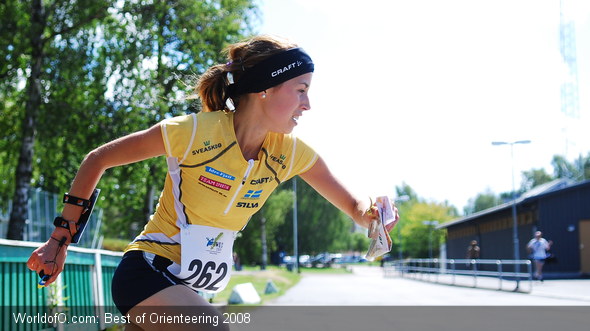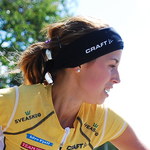
Beata Falk won three medals at the Junior World Champs in Gothenburg this year. Below Falk is presented for the nomination “The Ultimate Junior Orienteer of 2008″ through an interview made by World of O and Ultimate Orienteering.
About: Two of the major sources for international orienteering news on the Internet – World of O and Ultimate Orienteering – are organizing a poll to name “The Orienteering Achievement of 2008″ and “The Ultimate Junior Orienteer of 2008″. The winner in each category is decided in a vote amongst all the readers of World of O and Ultimate Orienteering after all nominees have been presented. Starting November 12th we present all nominees on a day-by-day basis. The poll is sponsored by Trimtex. Voting will be possible after all nominees have been presented from the voting page. See also all nominees in the initial press release.

Interview with Beata Falk
 Give a short presentation of yourself.
Give a short presentation of yourself.
I’m nineteen years old, was born in the “heart” of Sweden 200 km vest of Stockholm in a town called Örebro. That is where I grew up, but four years ago I moved to Eksjö in Småland to go to an orienteering college. Now when finished school, I’ve moved to England to work as an au-pair throughout the winter, which has been a great experience so far. Of course a lot of my spare time is spent on orienteering, and I really love to stay outside doing different kind of sports. I also like seeing my friends, to go for some shopping or just sit down talking in a cosy café. In the future I would like to have time to both study properly and try to reach as far as I possibly can in orienteering. At the moment I think I would like to study medicine, but I don’t know what future will bring.
What was the highlight of the 2008 season for you?
The whole year has been just amazing. I’ve enjoyed almost every second of it, but JWOC in Gothenburg was probably the highlight of the year. It was great fun to take part in such a big competition held in your native country! The feeling of coming into the finish on the relay with all people cheering is something I’ll never forget. But there have been lots of other nice moments throughout the year. I love the feeling of running when the body reacts in the way I want, when it feels like you could go on forever. To me those moments are real highlights, no matter if they occur on a huge competition or when I’m just out training.
I love the feeling of running when the body reacts in the way I want, when it feels like you could go on forever
What is your thought about being nominated for the orienteering achievement of 2008?
It is a great honour. I mean I’ve just had fun out there and if that has made other people think that I’m worthy this nomination… that would be incredible.
What are your main goals for the future?
My main goal for the future is, since a couple of years, trying to become as good as I possibly can. I mean I can’t do anything about my competitors, all I can change for the better is myself. I find it very exciting trying to find as many things as possible to improve; there is so much to learn! That is what inspires me, but of course there are also some short-term goals. I would love to go to JWOC and Italy next year, and performing some really good runs while enjoying everything around.
Where is your favourite place to orienteer – where you would advice our readers to travel?
Oh, what a question! Of course Sweden is a really nice place for orienteering. I love the terrain around, and south of, Stockholm as it’s quite tricky with a lot of details. The north of Sweden is very nice too, although I’ve not been there very much and Kilsbergen, just west of Orebro where I live is wonderful too. It’s a very tough area physically but it gives you a great deal of strength.
Apart from Sweden and the Nordic countries, which are also very nice, I loved orienteering in the south of France, Le Caylar. I think everyone should go there! There maps are varying from almost totally flat to really steep mountains and provides tricky orienteering from beginning to end. It’s impossible to get tired of it!
Can you describe your thoughest training week in 2008 (day-by-day)? Did that have any specific impact for your great achievements in 2008?
The toughest training weeks, except from those on camps, come during the winter and they often look quite the same so it’s hard to pick out just one, but this one was probably one of the toughest.
- Monday: 1) morning spinning, 1 hour . 2) afternoon strength, 1 hour
- Tuesday: Orienteering, long distance in a slow pace, 2 hours
- Wednesday: Intervals uphill, 1,5 hour (including warm-up)
- Thursday: 1) morning strength, 1 hour afternoon 2) long distance running both in forest and on tracks and in forest, 2 hours
- Friday: 1) morning cycling intervals 3min*10, 1 hour including warm-up 2) afternoon swimming, 1 hour
- Saturday: sprint orienteering + “springiness” , 1,25 hour
- Sunday: Resting day
I think, and hope that the winter training gave me a good base for the coming season. I think that the long distance orienteering in the forest is really important in order to get the strength needed for the competition season, and important races, especially when the terrain will be as tough as it was in Gothenburg.
I love the terrain around, and south of, Stockholm as it’s quite tricky with a lot of details
Are you a professional orienteer? How many percent is your work/study that you do besides orienteering compared to a full position – and how many hours do you train each year?
I’m not a professional orienteer, and I don’t think I would like to be that. At the moment I’m working as an au-pair in England and I have all time needed for the training I want to do, but except from training and taking care of the children there is not much time left to do other things. I think that unless you are a full time pro, that’s the way life would be no matter if you’re working or studying.
In your training: Do you put priority on running in the forest or on the road/track? What is your PB in 3000m/5000m?
I think both are important, especially when more and more of the big international races are held in continental terrain, where speed is essential. But running in the forest gives you great strength and endurance that is as necessary as the speed. An other part of the cross country or long distance running is that you learn how to push yourself further and further and continue even though you thought you couldn’t go on and that might be the most important part of it.
To be honest I’ve never run either 3000 or 5000 meters so I don’t know what my time would be. The only thing I have run are a couple of cross country competitions, but I would love to try it.
 World of O News
World of O News